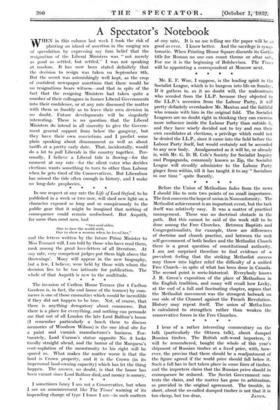Before the Union of Methodism fades from the news I
should like to note two points of no small importance. The first concerns the hope of union in Nonconformity. The Methodist achievement is an important event, but the task itself was relatively easy. It was a matter of practical management. There was no doctrinal obstacle in the path. But this cannot be said of the work still to be done among the Free Churches. Between Baptists and Congregationalists, for example, there are differences of doctrine and church practice, and between the unit self-government of both bodies and the Methodist Church there is a great question of constitutional authority. I am not surprised therefore to find evidence of a prevalent feeling that the striking Methodist success may throw into higher relief the difficulty of a unified Free Church—in spite of what has been done in Canada. The second point is socio-historical. Everybody knows J. R. Green's exposition of the place of Methodism in the English tradition, and many will recall how Lecky, at the end of a full and fascinating chapter, argues that the Methodist movement was the strongest bulwark on our side of the Channel against the French Revolution. History may repeat itself. The union of Methodism is calculated to strengthen rather than weaken thc conservative forces in the Free Churches.
* * * *














































 Previous page
Previous page